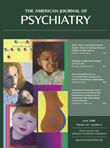Frontline Treatment of Combat Stress Reaction
To the Editor: I read with interest the article by Zahava Solomon, Ph.D., and colleagues on frontline treatment of combat stress reaction (1) . Comparing frontline treatment of combat stress reaction with traditional first aid offers a thought-provoking perspective into the management of posttraumatic stress disorder (PTSD).
My comments are regarding the study design. First, the study population was comprised of soldiers identified as suffering from combat stress reaction, which is not a very well-defined condition. There are no definite diagnostic criteria for combat stress reaction, and the symptoms can range from mild anxiety and irritability (which are an expected accompaniment of a combat situation) to frank hallucinations and delusions. Hence, treatment and comparison groups, although matched for demographic characteristics, may differ considerably in the severity of the combat stress reaction.
Second, the authors emphasized that allocation of treatment modality was determined by logistic constraints rather than by any systematic screening. The ascertainment of this fact was based on debriefings conducted after the ceasefire in 1983, which was 1 year after the war. This time, delay could have resulted in recall bias. Furthermore, it is unlikely that the treatment decision was always based on factors other than the soldier’s psychological condition. For instance, in the case of a soldier who became frankly psychotic, it is more likely that arrangements would be made for his evacuation to a civilian facility compared to a soldier who is suffering from mild anxiety due to combat exposure.
A loosely defined study condition coupled with the possibility of poor random assignment might have been a confounding factor in this study.
1. Solomon Z, Rami S, Mario M: Frontline treatment of combat stress reaction: a 20-year longitudinal evaluation study. Am J Psychiatry 2005; 162:2309–2314Google Scholar



